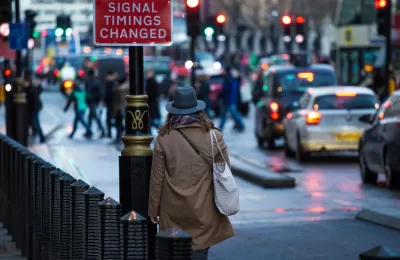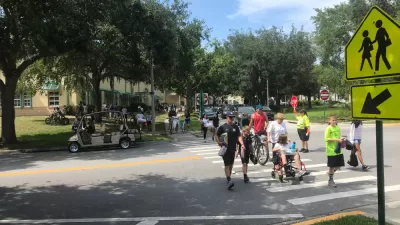A global survey shows that women around the world overwhelmingly cite fear of assault as the top reason for avoiding walking.

"In a new survey conducted by two Columbia University researchers and published by Leading Cities, people of all genders from 12 countries (including the U.S.) were asked about how safe — or unsafe — they felt while walking in their communities, and how the features of their built environments impacted their perceptions," reports Kea Wilson. Women-identified respondents overwhelmingly cited the fear of sexual assault as the top reason they "always" or "very frequently" choose to avoid walking to their destinations. "Of the small sample of gender non-binary people who responded to the survey, sexual assault also ranked as a top concern. But zero men who responded to the survey said the same."
For urban planners, this research has powerful implications that should influence the way we design streets and cities. "But the researchers behind the paper said that theirs is one of the first attempts to actually quantify just how deeply pervasive (and sometimes deeply inhibiting) fears of violence really are among women and enbies who walk — something which the predominantly male practitioners who shape the street environment don’t always fully appreciate."
Sethi underscores that those fears themselves are often just as big a barrier to women’s mobility as the actual violence and abuse women experience in the street realm. But in many communities, crime prevention strategies don’t prioritize creating environments that feel comprehensively safe — for instance, by cultivating inviting, walkable neighborhoods with lots of other pedestrians around — instead favoring isolated enforcement and prevention strategies at discrete points where crimes have already occurred, or are likely to.
"Interestingly, the features of the built environment that women say would make them feel safer while walking, like active street fronts and wide sidewalks, are not substantially different than what other genders want out of their roadways, too." The study's authors "say the survey provides more than enough evidence that the perspectives of women of diverse backgrounds needed to be better represented in the planning process, particularly in decision-making roles. And when they’re finally heard, cities may be surprised by how many people of all genders start walking for transportation."
FULL STORY: Fear of Assault Keeps Women From Walking

Alabama: Trump Terminates Settlements for Black Communities Harmed By Raw Sewage
Trump deemed the landmark civil rights agreement “illegal DEI and environmental justice policy.”

Study: Maui’s Plan to Convert Vacation Rentals to Long-Term Housing Could Cause Nearly $1 Billion Economic Loss
The plan would reduce visitor accommodation by 25% resulting in 1,900 jobs lost.

Why Should We Subsidize Public Transportation?
Many public transit agencies face financial stress due to rising costs, declining fare revenue, and declining subsidies. Transit advocates must provide a strong business case for increasing public transit funding.

Paris Bike Boom Leads to Steep Drop in Air Pollution
The French city’s air quality has improved dramatically in the past 20 years, coinciding with a growth in cycling.

Why Housing Costs More to Build in California Than in Texas
Hard costs like labor and materials combined with ‘soft’ costs such as permitting make building in the San Francisco Bay Area almost three times as costly as in Texas cities.

San Diego County Sees a Rise in Urban Coyotes
San Diego County experiences a rise in urban coyotes, as sightings become prevalent throughout its urban neighbourhoods and surrounding areas.
Urban Design for Planners 1: Software Tools
This six-course series explores essential urban design concepts using open source software and equips planners with the tools they need to participate fully in the urban design process.
Planning for Universal Design
Learn the tools for implementing Universal Design in planning regulations.
Smith Gee Studio
Alamo Area Metropolitan Planning Organization
City of Santa Clarita
Institute for Housing and Urban Development Studies (IHS)
City of Grandview
Harvard GSD Executive Education
Toledo-Lucas County Plan Commissions
Salt Lake City
NYU Wagner Graduate School of Public Service





























